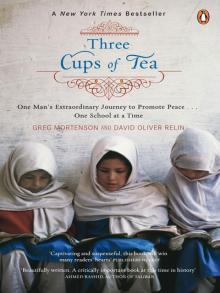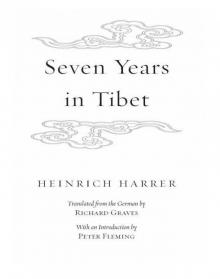Three Cups of Tea


Author: Greg Mortenson
Category: Memoir
Published: 2008
Series:
View: 438
Read Online'Here we drink three cups of tea to do business; the first you are a stranger, the second you become a friend, and the third, you join our family, and for our family we are prepared to do anything even die.
Haji Ali, Korphe Village Chief, Karakoram mountains, Pakistan
In 1993, after a terrifying and disastrous attempt to climb K2, a mountaineer called Greg Mortenson drifted, cold and dehydrated, into an impoverished Pakistan village in the Karakoram Mountains. Moved by the inhabitants' kindness, he promised to return and build a school. Three Cups of Tea is the story of that promise and its extraordinary outcome. Over the next decade Mortenson built not just one but fifty-five schools especially for girls in remote villages across the forbidding and breathtaking landscape of Pakistan and Afghanistan, just as the Taliban rose to power. His story is at once a riveting adventure and a testament to the power of the humanitarian spirit.
**Amazon.com Review
From Viking Press
In regards to the 60 Minutes episode that aired April 17, 2011: * "Greg Mortenson’s work as a humanitarian in Afghanistan and Pakistan has provided tens of thousands of children with an education. 60 Minutes is a serious news organization and in the wake of their report, Viking plans to carefully review the materials with the author."*
From Publishers Weekly
Starred Review. Some failures lead to phenomenal successes, and this American nurse's unsuccessful attempt to climb K2, the world's second tallest mountain, is one of them. Dangerously ill when he finished his climb in 1993, Mortenson was sheltered for seven weeks by the small Pakistani village of Korphe; in return, he promised to build the impoverished town's first school, a project that grew into the Central Asia Institute, which has since constructed more than 50 schools across rural Pakistan and Afghanistan. Coauthor Relin recounts Mortenson's efforts in fascinating detail, presenting compelling portraits of the village elders, con artists, philanthropists, mujahideen, Taliban officials, ambitious school girls and upright Muslims Mortenson met along the way. As the book moves into the post-9/11 world, Mortenson and Relin argue that the United States must fight Islamic extremism in the region through collaborative efforts to alleviate poverty and improve access to education, especially for girls. Captivating and suspenseful, with engrossing accounts of both hostilities and unlikely friendships, this book will win many readers' hearts. (Mar.)
Copyright © Reed Business Information, a division of Reed Elsevier Inc. All rights reserved.
Haji Ali, Korphe Village Chief, Karakoram mountains, Pakistan
In 1993, after a terrifying and disastrous attempt to climb K2, a mountaineer called Greg Mortenson drifted, cold and dehydrated, into an impoverished Pakistan village in the Karakoram Mountains. Moved by the inhabitants' kindness, he promised to return and build a school. Three Cups of Tea is the story of that promise and its extraordinary outcome. Over the next decade Mortenson built not just one but fifty-five schools especially for girls in remote villages across the forbidding and breathtaking landscape of Pakistan and Afghanistan, just as the Taliban rose to power. His story is at once a riveting adventure and a testament to the power of the humanitarian spirit.
**Amazon.com Review
From Viking Press
In regards to the 60 Minutes episode that aired April 17, 2011: * "Greg Mortenson’s work as a humanitarian in Afghanistan and Pakistan has provided tens of thousands of children with an education. 60 Minutes is a serious news organization and in the wake of their report, Viking plans to carefully review the materials with the author."*
From Publishers Weekly
Starred Review. Some failures lead to phenomenal successes, and this American nurse's unsuccessful attempt to climb K2, the world's second tallest mountain, is one of them. Dangerously ill when he finished his climb in 1993, Mortenson was sheltered for seven weeks by the small Pakistani village of Korphe; in return, he promised to build the impoverished town's first school, a project that grew into the Central Asia Institute, which has since constructed more than 50 schools across rural Pakistan and Afghanistan. Coauthor Relin recounts Mortenson's efforts in fascinating detail, presenting compelling portraits of the village elders, con artists, philanthropists, mujahideen, Taliban officials, ambitious school girls and upright Muslims Mortenson met along the way. As the book moves into the post-9/11 world, Mortenson and Relin argue that the United States must fight Islamic extremism in the region through collaborative efforts to alleviate poverty and improve access to education, especially for girls. Captivating and suspenseful, with engrossing accounts of both hostilities and unlikely friendships, this book will win many readers' hearts. (Mar.)
Copyright © Reed Business Information, a division of Reed Elsevier Inc. All rights reserved.
 My Fair Lazy: One Reality Television Addict's Attempt to Discover
My Fair Lazy: One Reality Television Addict's Attempt to Discover Help! I'm Trapped in a Supermodel's Body
Help! I'm Trapped in a Supermodel's Body The Hiding Place
The Hiding Place Seven Years in Tibet
Seven Years in Tibet Empire: A Novel
Empire: A Novel A Mad Desire to Dance
A Mad Desire to Dance Books for Living
Books for Living The Fall of Princes
The Fall of Princes